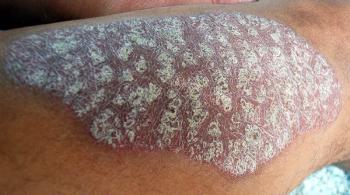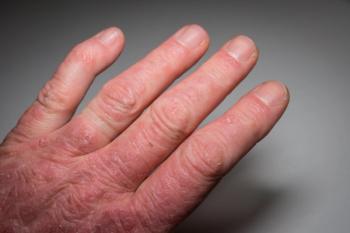
Updates from 2 recent medical meetings about links between the gut, psoriasis, and other skin disease, as well as the risk of COVID-19.

Updates from 2 recent medical meetings about links between the gut, psoriasis, and other skin disease, as well as the risk of COVID-19.

Psoriasis may be associated with an increased prevalence of type 1 diabetes (T1D).

Patients with psoriasis have a higher level of interleukin-30 (IL-30) than healthy patients, according to a recent study.

Each month of duration of 90% or more improvement in Psoriasis Are and Severity Index significantly impacted patient-reported outcomes in patients with psoriasis.

Egyptian dermatologists were asked about the effect of COVID‐19 on prescription patterns, appointment rescheduling, therapy decisions, and telemedicine use.

The long-term findings come from a subgroup analysis of 120 patients in Japan taking part in an extension of the 3-part, double-blind, randomized, controlled reSURFACE 1 trial.

If left untreated, patients with psoriatic arthritis (PsA) are at risk of irreversible joint damage, cardiovascular disease, and death. Some other conditions conflated with PsA include chronic eczema, seborrheic dermatitis, onychomycosis, lichen planus, and nodular prurigo.

Ilumya (tildrakizumab) was shown to be safe and effective in controlling moderate to severe psoriasis for adults through 5 years of treatment in a recent study.

A Taiwanese study revealed that attributes associated with polycystic ovary syndrome (PCOS) may increase the risks of those patients developing psoriasis as well.

A study analyzing patients with psoriasis revealed that personality traits may have a greater impact on the development of social anxiety than disease severity.

The impact of psoriatic arthritis on quality of life can vary depending on geographic location and culture, according to a global patient survey.

In 90% of patients, psoriasis precedes psoriatic arthritis by an average of 7 years, providing a window of opportunity for early intervention and possible prevention of psoriatic arthritis.

Authors of an opinion piece concluded that not only are immunosuppressed patients with psoriasis not at an increased risk of developing serious complications related to coronavirus disease 2019 (COVID-19), their medications may help mitigate potential issues.

Patients with psoriasis often have other physical diseases, and these somatic comorbidities can have a bigger effect on the patient’s mental health than the skin symptoms from their psoriasis, according to a study published in JAMA Dermatology.

The study looked at patients taking ixekizumab or adalimumab.

A global epidemiological study on psoriasis has found that the prevalence, incidence, and burden of suffering caused by the disease has risen over the last 3 decades.

Use of biologics to treat psoriasis may impact prevalence of comorbidities like depression and obesity, according to an abstract presented at the Virtual 2020 International Society for Pharmacoeconomics and Outcomes Research meeting.

A recent analysis describes the effects of the pandemic, including restrictions on outdoor activities and loss of income, on patients with psoriasis in China earlier this year.

Despite some clues, scientists don’t yet understand which patients with psoriasis are likely to eventually develop psoriatic arthritis; solving that riddle could have major impacts on patient care.

Psoriatic arthritis and psoriasis both place a significant economic burden on patients, but a new analysis shows the burden on people with the former is significantly higher.

A patient’s sex, disease duration, and residence were the most common sociodemographic factors shown to affect illness acceptance, life satisfaction, sense of stigmatization, and quality of life among those who have psoriasis, according to the results of a recent study.

Two of the panelists appearing during the Virtual ISPOR 2020 meeting preview what's needed in improving value assessment: Lou Garrison, PhD, of the University of Washington, and Leah Howard, JD, of the National Psoriasis Foundation.

Some oncologists refrain from prescribing checkpoint immunotherapy in patients with Kaposi sarcoma who also have psoriasis or other skin conditions. A new case report says the therapy can be successfully completed while still controlling the skin condition.

Platelet function may aid in determining disease severity for patients with psoriasis who are at an increased risk of developing cardiovascular disease (CVD) and increased inflammation, a review notes.

Guidelines created by the American Academy of Dermatology (AAD) and the National Psoriasis Foundation (NPF) address care management and treatment options for patients with psoriasis in relation to the increased risk of developing inflammatory, cardiovascular, and metabolic conditions.

259 Prospect Plains Rd, Bldg H
Cranbury, NJ 08512
© 2025 MJH Life Sciences®
All rights reserved.
